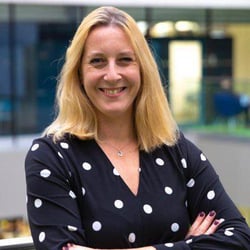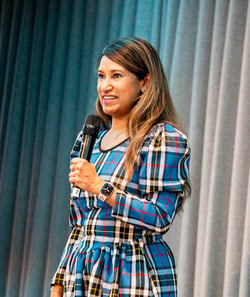How Senior Civil Servants are thinking about Generative AI
Some are taking a watch-and-wait approach, while others see potential for Generative AI (GenAI) to save time and enhance services.
At the most recent Government Transformation Summit, Senior Civil Servants showcased a number of successful and innovative Gen AI pilots: Fiona James, Chief Data Officer at the Office for National Statistics (ONS) spoke about StatGPT, an experimental search function for ONS documents and Vidya ShankarNarayan, Assistant Deputy Minister & CIO, Agriculture & Agri-Food Canada, detailed the launch of AgGPT, which is poised to transform the agricultural sector.
So how these early adopters identifying and scaling relevant use cases?
“There's a lot of appetite to identify and take forward GenAI, we've identified around 20 opportunities across ONS,” James said. She emphasised the importance of a human-led approach when experimenting and scaling AI, which means giving people space to play. “We have an AI playground, which is really helping us to think more about how to implement this technology across the organisation with trust and quality at the heart.” This is the key to forming better policies while laying the foundations for a culture that supports it.
around 20 opportunities across ONS,” James said. She emphasised the importance of a human-led approach when experimenting and scaling AI, which means giving people space to play. “We have an AI playground, which is really helping us to think more about how to implement this technology across the organisation with trust and quality at the heart.” This is the key to forming better policies while laying the foundations for a culture that supports it.
She continued: “We're very keen to develop our own Large Language Model using Google’s Vertex AI so that we can feed ONS data into something we can trust a little bit more. That's definitely the direction of travel.”
The last time there was this much momentum in the digital community was the birth of the internet. This time it’s going way faster - the pace of change is significantly quicker and the technology is cheaper. While that presents a challenge, it also represents a huge opportunity that the public sector needs to take advantage of, said ShankarNarayan.
She spoke about her team’s work in creating AgGPT, an agricultural chatbot, which is replacing Agriculture and Agri-Food Canada’s existing services search function. It has already been developed to the point where it can provide clear insights and advice to  farmers and researchers. The team recently won the Public Service Data Challenge for its chatbot – participation which hastened its development, the team said.
farmers and researchers. The team recently won the Public Service Data Challenge for its chatbot – participation which hastened its development, the team said.
While there are obvious opportunities for GenAI in fields such as research, evidence-gathering, text production and knowledge management – the majority of Senior Civil Servants are still wrestling with the challenges it presents around transparency, accountability and ethics, said Charlie Boundy, Chief Data Officer at Companies House.
“The tricky one is around knowledge management and the risk of producing incorrect or misleading information,” he said. “Companies House is changing from being an organisation which takes all the information and just processes and registers it, to checking the accuracy of it. We're still carefully evaluating whether AI can help with that.”
First, it's critical that departments gets their data and infrastructure in the right place, he said. “As a Chief Data Officer, it’s important to get your transparency right, tell people what you're doing with this stuff and make sure you've got ways of monitoring the data being used.”
what you're doing with this stuff and make sure you've got ways of monitoring the data being used.”
Boundy also highlighted the need for government organisations to align their combined forces so they are not all working on the same thing, and to share knowledge amongst each other. “Between us as a bunch of departments, we’ve probably got half a dozen excellent use cases. We’ve just got to find ways of collaborating over those.”


%20(2).jpg?width=600&name=Podcast%20Thumbnails%20(square)%20(2).jpg)


